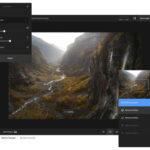Stop motion photography seems like a lot of work—and it is! But it’s not blunt hard work. It needs a very calculated approach. Trisha Zemp has mastered the technique:
Stop motion photography requires you follow a few key rules.
Do not touch the camera, ever!
Everything depends on your camera staying perfectly still during the whole shoot. You don’t want the camera to wobble or move or do anything that alters the frame. This means you should be using a tripod, a remote trigger and, above all, a battery that you can plug into an AC socket via an adapter.

A camera AC adapter is a great tool.
Typically a stop motion photography session can last for up to 8 hours. A single battery will not last that long. A battery that’s plugged into an AC socket does not run the risk of dying on you. All these tools will allow you to shoot remotely without having to touch your camera.

A tripod is an absolute must for shooting stop-motion photography
Frame Rate
Stop motion does not require a fast frame rate. A fast frame rate like the cinematic 24 frames per second (fps) isn’t quite suitable for how stop motion photography works. For this genre you need a slightly bouncy or wiggly movement that can only happen when you pull down the frame rate. Zemp reveals that she prefers using a frame rate of 15 fps, which she further slows down to 10 fps for Instagram videos.
Lighting
Lighting is an important aspect of stop motion photography—and for that matter any type of photography. Zemp reveals that you can use any type of lighting based on your own preferences. But that light mustn’t change during the course of the shoot. If the light changes frequently during the course of the shoot it will take a lot of time during post-processing to fix.
The choice of lights for Zemp is the Rosco Vector LitePad, which is a continuous light. She can see what she’s shooting all the time.
No matter what light you use, you have to be careful that your coming into the shot to arrange the pieces and then stepping back doesn’t in any way affect the images.
Camera Settings
Zemp uses the following camera settings for her shots: 1/10 of a second, f/6.3, and ISO 250. Choosing the right aperture is critical. Between f/5 to f/8 your lens performs to its optimum capabilities. Vignetting is less of an issue, and chromatic and other aberrations are also at their least.
Have you tried stop motion? What tips do you have for beginners?
Like This Article?
Don't Miss The Next One!
Join over 100,000 photographers of all experience levels who receive our free photography tips and articles to stay current:






Leave a Reply